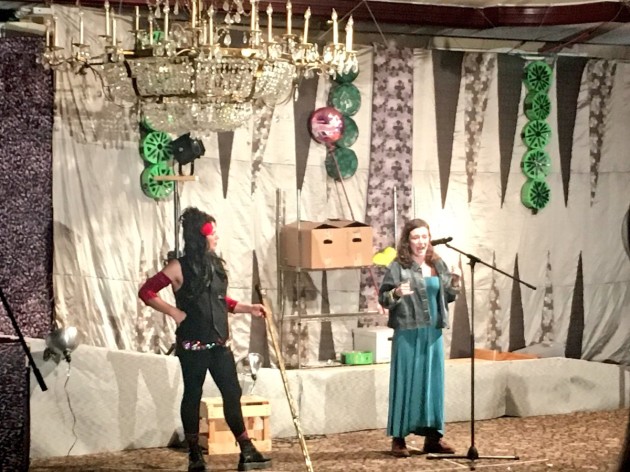
by Justine Orlovsky-Schnitzler
This Jewish Student Organizer Is Fighting Against Gun Violence and School Militarization

Rosa Lander (right) speaking at JFREJ’s Purim Carnival and March.
It would be inaccurate to categorize gun violence, particularly in schools, as a new issue. Though the Parkland shooting last month has galvanized a large, primarily youth-led movement against gun accessibility, the United States has a long and deadly relationship with firearms. Though the last 20 years has seen a surge of mass shootings, deadly force has long existed in state-sponsored institutions. It is vital that those involving themselves in anti-gun activism recognize the foundations laid by groups like Black Lives Matter, while simultaneously acknowledging the role that police forces play in perpetuating institutionalized violence.
With these facts in mind, and the Parkland shooting still fresh, Jews for Racial and Economic Justice (JFREJ), in collaboration with the Aftselakhis Spectacle Committee, co-organized their Purim Carnival. Officially titled the Kids’ Purim Carnival of Resistance and Parade (co-sponsored by Kolot Chayeinu, the Workmen’s Circle, and Repair the World NYC), carnival attendees—primarily school-aged children—played justice-themed games and painted brightly colored signs before taking off on foot together for New York Democratic Senator Simcha Felder’s office in New York City. (Felder caucuses with the Republicans in the State Senate.) Staff writer Justine Orlovsky-Schnitzler called one of the student organizers, Rosa Lander, to discuss how the event transpired and what broader impact the students hoped to make.
Justine Orlovsky-Schnitzler: First, could you give Lilith readers some background information?
Rosa Lander: I am 14 years old, and I attend Bard Early College High School in Manhattan. I’ve been interning with JFREJ just this year, but they’re really involved in the synagogue I have grown up in. So I’ve been familiar with their work for some time.
JO-S: How did this event come together?
RL: This year, especially being in the wake of the Parkland shooting, we felt the time was right to do a larger event. This [Purim] carnival is primarily a children’s event, and we knew as organizers looking at the state gun [laws] that Senator Felder wants to put cops in our schools. So it naturally followed from there. The carnival turned into a march—or parade, really—toward our senator’s office. The carnival was happening in his district, so we felt it was an opportunity we couldn’t pass up.
JO-S: What was the atmosphere like during the march?
RL: It was fun—there was a heavy message, but it was an uplifting atmosphere. I think it went very well—it was a bunch of little kids invested in social justice, which is always exciting to see. Because it was more of a parade, it felt very exciting. It was definitely more motivating than saddening. There was a little girl who got up to speak about how she was in elementary school going to middle school, and was now aware of how dangerous that could be given our current political atmosphere. It was almost painful, but insanely empowering, to hear little kids talking it, and wanting to make things change for the better.
JO-S: What kind of reception did you receive? Did it match your expectations?
RL: Well…walking around with large puppets and a band in a strongly Orthodox community can be slightly awkward. I will say—we very elaborately costumed. We definitely looked more like a parade than a march, but it was a parade with a purpose. We had signs, that kids had made during the party part of the event, and a big banner. The kids’ signs said things like “arm me with knowledge.” They had their little messages, and it was sweet, but also very impactful.
We got a few looks, but we also got a lot of people taking pictures and responding. It was generally a good thing. I think if you are in New York as a resident, especially with children, you get the idea that we don’t need more cops—especially in our schools. This issue is so moral to me—if you’re talking about a safer learning environment and kids not being fearful—it’s hard to dispute.
Once we arrived at [Senator Felder’s], we had some people on a mic giving speeches in front of his office. I did one—basically saying, we don’t approve of this, we need counselors, not guns in our schools.
JO-S: What speaks to you about this issue?
RL: Being a high school student, in a time like this, it’s almost impossible not to care. It’s important to focus on issues close to you, even if Parkland is far away. This country has seen too much gun violence. We need to say “thoughts and prayers” aren’t enough—we need teenagers to be speaking up. We’re the most knowledgeable about our experiences. It’s not something white politicians who have been privately educated their whole lives will know about. In public schools, especially in a city, we know people directly affected by it. More cops in schools are not the answer, period.
JO-S: What do you see as the next steps? Are there concrete plans to continue demonstrations, etc.?
RL: We are planning another event over Passover—which basically means we are going to the Senator with four questions about gun violence, and things related to that. We are invested in a partnership with groups of teens and youth of color who are really invested in the “counselors not cops” movement. We want to keep organizing according to our Jewish identity to get that message to Felder. We want to show him there is a whole group of leftist Jews that he represents—and we are here to stay.
The views and opinions expressed in this article are the author’s own and do not necessarily reflect those of Lilith Magazine.